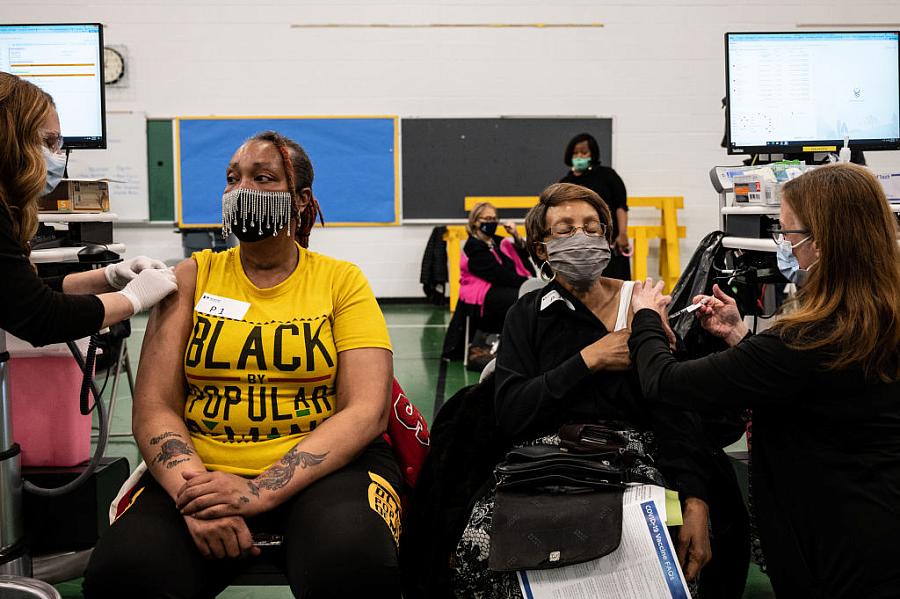How the hidden harm of COVID-19 is afflicting communities of color

Andrea Moore and her mother Alma Penn receive COVID-19 vaccines in an elementary school gym on April 2 in Louisville, Kentucky.
(Photo by Jon Cherry/Getty Images)
When the country shut down last year at the outset of the pandemic, so did routine health care. The backlog of missed appointments and deferred care is likely staggering. While the exact size of the backlog remains up for debate, its overall magnitude does not.
That’s why the numerous studies documenting high rates of deferred care for serious conditions during the pandemic have experts so worried: prolonged radio silence, in these illnesses, can be life-threatening. Dr. Colette DeJong and colleagues called deferred care a “hidden harm of COVID-19,” stating that “there can be little doubt that deferral of care for [chronic conditions] leads to harm and contributes to the rise in at-home deaths during the pandemic.”
As with the rest of the pandemic, initial evidence suggest that communities of color disproportionately bear these hidden harms. A September CDC report found that Black and Hispanic patients were 7% and 15% more likely, respectively, to forego medical care during the pandemic than were whites. Individuals with chronic diseases were up to 31% more likely to forego care than those who were healthy, while those at a high risk of severe COVID-19 were 33% more likely to forego it.
(A separate Harvard study found that those at a high risk of severe COVID-19 disproportionately belong to communities of color, while a Commonwealth Fund report found that Medicaid patients, the uninsured, and those who receive their care from community health centers were more likely to defer care.)
While it may be too early to observe increased complications from untreated chronic conditions due to deferred care, emerging evidence contains ominous warnings of what the future may hold. For example, a March 2021 Commonwealth Fund report found that almost a quarter of those surveyed were unable to access prescription medicines during the pandemic. Clarence Gravlee, a medical anthropologist at the University of Florida whose work focuses on the intersection of social justice and health disparities, has speculated that deferred care during COVID-19 — combined with long-standing structural inequities —may constitute a “syndemic in the making.” (A syndemic describes a large-scale health crisis caused by multiple simultaneous factors.)
Accordingly, this project for the 2021 California Fellowship will evaluate the rates of complications from chronic diseases in communities of color — both in California and across the country — since last March. It will use a combination of peer-reviewed literature, insurance claims data, county and hospital utilization data, clinical anecdotes, and expert interviews to shine a light on why care is being deferred in these groups, and how this portends potentially devastating consequences for non-white communities.
I’ll focus on the lived experiences of families whose loved ones have suffered consequences from deferred care of chronic diseases, focusing in particular on individuals from Black, Latino, indigenous (such as the Yurok tribe), and migrant (such as East Asian and African) communities.

